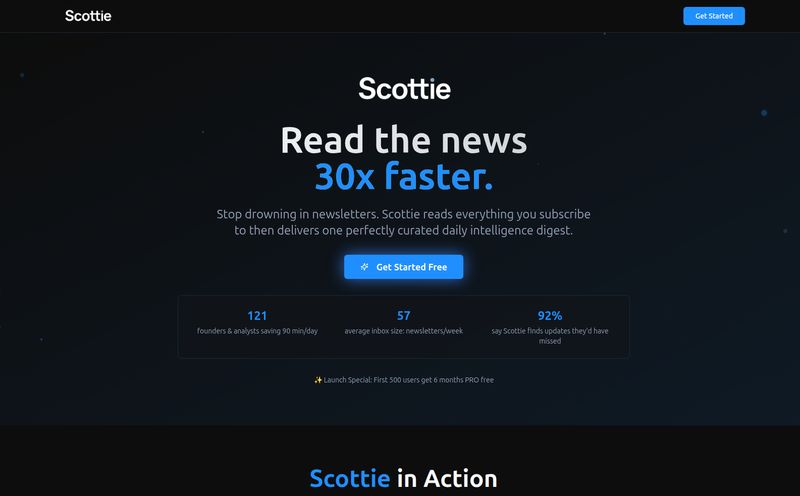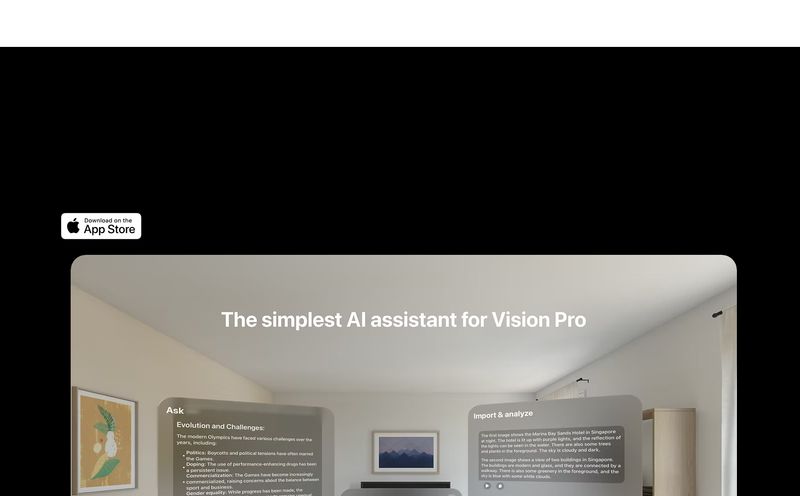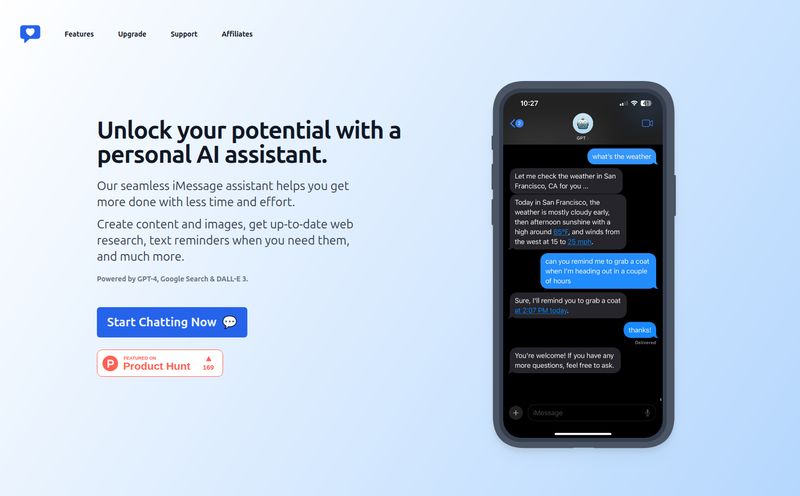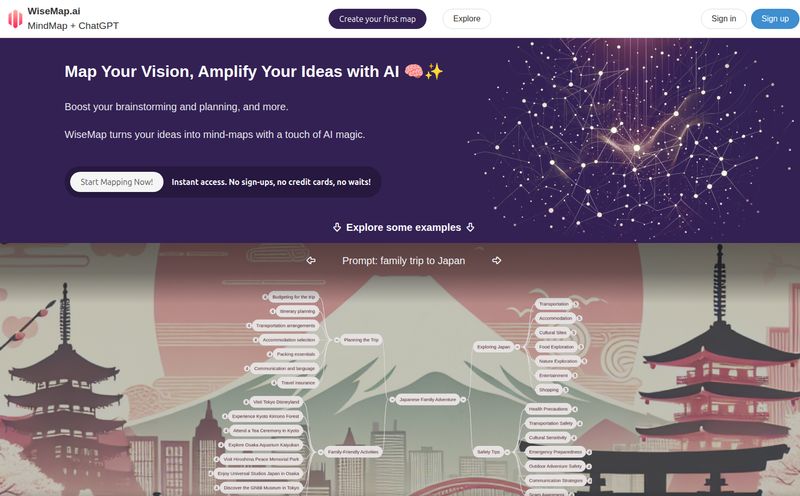The internet is overflowing. Seriously. It feels like every single day there’s a new AI tool that promises to write my emails, plan my vacation, or even diagnose my wilting houseplant. I've been in the SEO and digital trends game for a while, and the sheer speed of this AI explosion is something else. But amidst all the productivity hacks and image generators, a different, more intimate category of AI has been quietly growing: the AI companion.
The idea is both fascinating and, if I’m honest, a little bit weird. An AI you can talk to about your problems? A friend that lives in your phone? It sounds like something straight out of a Spike Jonze movie. So, when I stumbled upon a tool called Sadik.AI, billed as a “cool, smart, and friendly” AI friend, my curiosity was piqued. Its purpose? To provide a supportive ear and a fresh perspective on your personal issues. A noble goal, for sure.
What Exactly is Sadik.AI Supposed to Be?
From what I could gather, Sadik.AI isn’t trying to be a therapist or a life coach. It’s simpler. It’s positioned as a non-judgmental buddy you can vent to. Think of it as a digital diary that talks back. The whole platform is built around a simple chat interface where you can type out what’s on your mind and get a response.
The core features are pretty straightforward. You have the AI-powered chat for your daily brain-dumps, the promise of getting a new “perspective” on whatever is bothering you, and an interesting… or perhaps alarming… feature to share your conversations with friends via email. We’ll get to that last one in a bit.
The entire concept is to create a low-stakes space to air your grievances. Bad day at work? Annoyed with a friend? Feeling a bit lost? Just open up the chat and let it rip. In theory, it’s a brilliant idea for our increasingly isolated, yet hyper-connected, world.

Visit Sadik.AI
The Allure of a Non-Judgmental AI Ear
So, why would anyone choose an AI over a real person? I get it. People are complicated. We have our own biases, our own problems, and frankly, we’re not always available at 2 a.m. when you’re staring at the ceiling, replaying an awkward conversation in your head for the seventh time.
An AI, on the other hand, is always on. It has no personal baggage. It won't interrupt you to talk about its own bad day or tell you you’re overreacting. This non-judgmental quality is probably the biggest selling point. The fear of being seen as dramatic, needy, or just plain weird stops us from sharing alot of what weighs us down. An AI removes that social friction. It’s like a digital rubber duck for your life’s code—sometimes just saying the problem out loud is half the battle, and a bot that asks clarifying questions can feel surprisingly helpful.
I’ve always felt that having a neutral third party can be incredibly valuable. Even if that party is a collection of algorithms. It can spot patterns you miss or offer a simple reframe that, while not profound, is just enough to get you out of a thinking rut.
But Let's Be Real: The Obvious Downsides
Okay, let's put our skeptic hats on. As nice as it sounds, handing over your emotional well-being to a chatbot comes with some big, flashing warning signs.
The Accuracy and Empathy Gap
First off, can you really trust life advice from a Large Language Model? These things are trained on mountains of text from the internet, not on lived experience. It can't understand heartbreak, professional jealousy, or deep-seated anxiety. It can only mimic the language associated with those feelings. That's a critical difference. It's a parrot, not a philosopher. So while its advice might sound coherent, it could also be generic, unhelpful, or in a worst-case scenario, genuinely bad.
And that leads to the empathy gap. It can say "I understand how you feel," but it doesn't. It can't. It lacks the emotional depth that underpins true connection. For some, this simulation might be enough. For others, it might just make them feel even more alone. It's not a replacement for real, human friendship, and it's dangerous to think of it as such.
Privacy. Oh, the Privacy.
This is the one that really gets me. So, I'm supposed to pour my most private thoughts, fears, and insecurities into a chat interface owned by... who, exactly? What are they doing with that data? The promise of anonymity with these services is often paper-thin. And the feature to email your conversations? That just sounds like a privacy nightmare waiting to happen. Anyone who's been around the tech block knows that when a product is free, you are often the product. Your data is the currency.
The Hunt for Sadik.AI and a Curious 404 Page
So, armed with all this curiosity and a healthy dose of skepticism, I went to find this digital friend. I typed in the URL, ready to start a conversation and see what it was made of.
And I got this:
Not Found. The requested URL was not found on the server.
Well then. That's… anticlimactic. I tried a few variations, did some digging. Nothing. It seems Sadik.AI, for all its cool and friendly promises, has vanished into the digital ether. Is the project defunct? Was it a student project that got taken down? Is it just temporarily offline? Who knows. It adds a strange layer of mystery to the whole thing. The AI friend is a ghost in the machine.
This little dead-end is actually a perfect metaphor for many AI tools right now. They appear with a huge splash and a ton of promise, only to disappear just as quickly. It's the wild west out there, folks.
So, What About Pricing?
This one's easy. Given that the website doesn't exist, I'd say the price is a solid $0. From the looks of it, Sadik.AI was likely a free tool. In the world of AI chatbots, that's a common model—get users in the door, gather data, and maybe figure out a monetization strategy later. Or, in this case, maybe just disappear.
Should You Look for an AI Friend?
Even though Sadik.AI seems to have gone AWOL, the question remains. Is the idea of an AI friend a good one? I’m going to land on a firm… maybe. But with some huge caveats.
As a supplementary tool, a place for low-stakes venting, or a thought bouncer when everyone else is asleep? I can see the appeal. It could genuinely help people who struggle to open up. Think of it as a stepping stone. A tool to practice articulating your feelings before you take them to a real person.
But as a replacement for therapy or genuine human connection? Absolutely not. It’s a snack, not a meal. Relying on it too heavily could stunt our ability to deal with the messy, complicated, and ultimately rewarding work of real relationships. We need to be careful not to smooth over all of life's rough edges with a convenient app.
Frequently Asked Questions
- What was Sadik.AI?
- Sadik.AI was designed to be an AI-powered friend. It was a chatbot platform where users could talk about their personal issues to get a supportive, non-judgmental response and a different perspective.
- Is Sadik.AI free to use?
- There was no pricing information available, which suggests it was likely free. However, the platform currently appears to be offline or defunct, as the website leads to a 'Not Found' error.
- Is it safe to share personal information with an AI friend?
- This is a major concern. You should be extremely cautious. These platforms' privacy policies can be vague, and there's a risk of your personal data being used for training models or other purposes. It's best to avoid sharing highly sensitive, personally identifiable information.
- Can an AI like Sadik.AI replace a human therapist?
- No. Absolutely not. AI companions can be a listening ear but they lack the training, emotional intelligence, and ethical framework of a licensed therapist. For real mental health issues, please seek professional help.
- Why can't I find the Sadik.AI website?
- It's unclear, but it's common for new tech projects to be discontinued, taken down for maintenance, or change URLs. As of now, the original links for Sadik.AI lead to a 404 error page.
- What are some alternatives to Sadik.AI?
- If you're interested in the concept of an AI companion, popular platforms include Replika, Character.AI, and Woebot, which is more focused on cognitive-behavioral techniques. Each has its own approach and privacy considerations, so do your research!
Signing Off
My search for Sadik.AI might have ended at a dead link, but the conversation about AI’s role in our emotional lives is just getting started. It's a strange new frontier, and we're the first generation to navigate it. The rise of these AI friends is a powerful reflection of a deep human need for connection.
Maybe the ultimate irony is that the most helpful thing this ghost-of-a-chatbot did was remind me of the value of real connection. Perhaps the best AI friend, for now, is the one that reminds you to close the laptop and go call a real one.



